- Joined
- Jan 2, 2014
- Messages
- 8,851
Hi All,
I picked up a small parts cabinet with hundreds of the spiral spring type thread repair inserts. Like heli-coil but likely from another manufacturer. I think I got a good deal as the whole lot was just $50. However, it did NOT include all the required drill bits, oversize taps, and installation tools.
(it also had a few pem-nut inserts and other stuff)
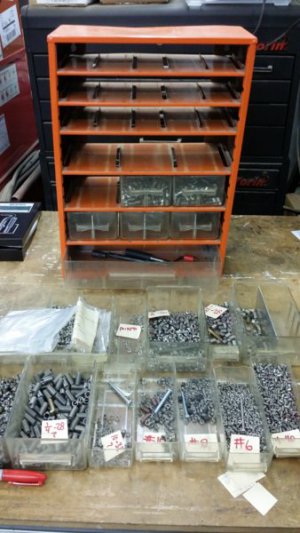
(Note all the labels and bolts in the bins are my first pass attempt at identifying them.....)
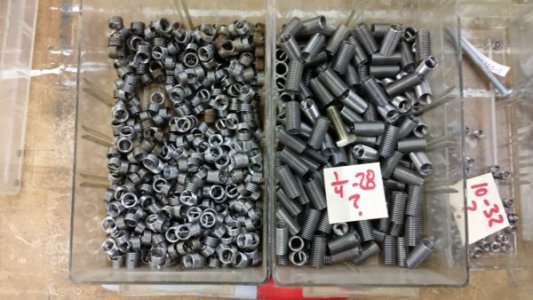
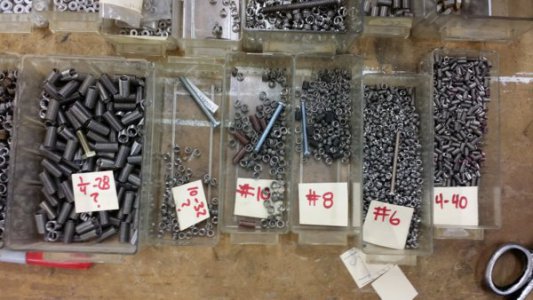
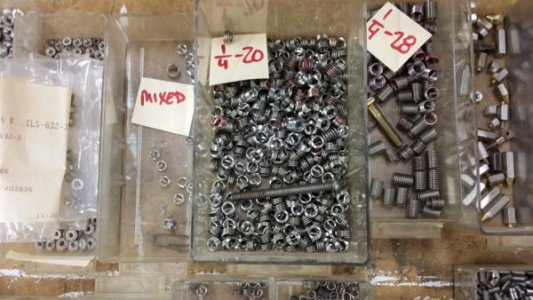
Once I started going thru it, I realized that it's difficult to determine exactly what threads they are meant to repair!
Why?
When I try a similar thread repair insert from the kit shown below on a bolt of the marked size, I notice:
1) it spreads the inserts coils as I thread it on. That is, the collapsed or "un-sprung" insert looks to be a different thread count than the bolt it is sized for, and
2) the insert seem loose on the bolt. I think the insert gets smaller diameter when installed into a hole.
So the insert looks off in both thread-count and diameter from the thread they are made for!
Here's the type of kits they try to sell for $180 regular price, I got this one on sale:
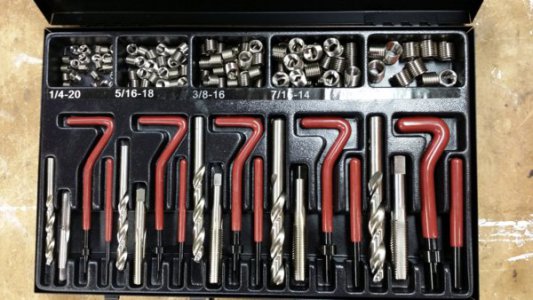
Things I have noticed:
I believe that the determination of coarse vs. fine thread can be made by looking at the "gauge" of wire used for the inserts.
I suppose I could:
Thanks!
-brino
I picked up a small parts cabinet with hundreds of the spiral spring type thread repair inserts. Like heli-coil but likely from another manufacturer. I think I got a good deal as the whole lot was just $50. However, it did NOT include all the required drill bits, oversize taps, and installation tools.
(it also had a few pem-nut inserts and other stuff)

(Note all the labels and bolts in the bins are my first pass attempt at identifying them.....)



Once I started going thru it, I realized that it's difficult to determine exactly what threads they are meant to repair!
Why?
When I try a similar thread repair insert from the kit shown below on a bolt of the marked size, I notice:
1) it spreads the inserts coils as I thread it on. That is, the collapsed or "un-sprung" insert looks to be a different thread count than the bolt it is sized for, and
2) the insert seem loose on the bolt. I think the insert gets smaller diameter when installed into a hole.
So the insert looks off in both thread-count and diameter from the thread they are made for!
Here's the type of kits they try to sell for $180 regular price, I got this one on sale:

Things I have noticed:
I believe that the determination of coarse vs. fine thread can be made by looking at the "gauge" of wire used for the inserts.
I suppose I could:
- go and order one each of a bunch of new ones for comparison purposes, as the new ones would be labelled
- try to find fully dimensioned catalog drawings of similar inserts and spend a day measuring
- go drill and tap a bunch of holes and try a bunch of these inserts as "practice" to ID them
Thanks!
-brino
Last edited:

